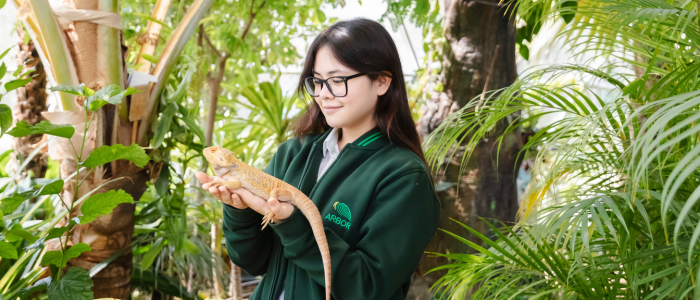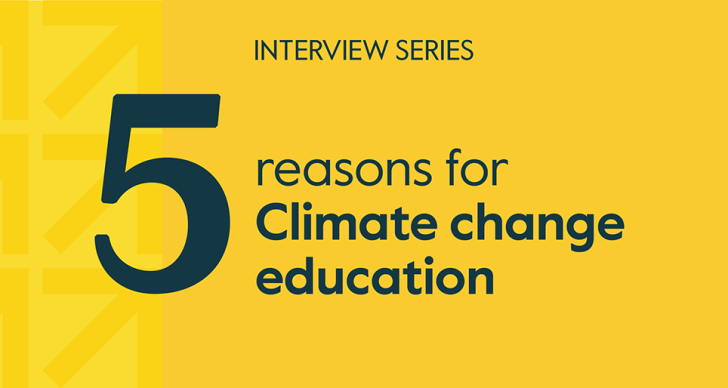Education is widely recognised as the key to tackling the climate crisis. As Cambridge launches a new introduction paper to climate change education for schools around the world, we spoke to Frances Powell, the headteacher at a leading school on sustainability in Dubai to find out more about how they teach climate change education in their school.
In this blog series, Cambridge asks school leaders five questions on the value of teaching a Cambridge education in their schools. We aim to work with schools across the world to deliver an education that gives learners the knowledge and skills they need to make a positive impact in the world.

1) The Arbor School, a leading eco school in Dubai, has an innovative and ecological approach to education, one that nurtures environmental mindfulness and teaches learners to take action and contribute to the future of our world. Why have you chosen this approach?
We believe that for young people to take action in an authentic way and contribute to the world around them, we need to make sure they have a curriculum that embeds those aspects. We do not treat climate change education as an additional or extracurricular option. By teaching Cambridge Global Perspectives IGCSE – which is mandatory in our school along with English, Maths, and Science, and bringing eco-literacy into our curriculum, our students can critically analyse the world around them. They can look confidently at their place in the world and the power they hold in being able to change aspects and ideas.
2) What has been the impact as a result of this approach? What actions have students taken because of this?
One of the key things we have seen is how articulate our students are when speaking about climate change. They think deeply and engage critically with ideas and concepts and as a result, have won many awards. Our students have recently chosen their A Level subjects and one of the top choices is the Cambridge Global Perspectives A Level. This shows they are engaging with it, and they can thrive and flourish. They can see something bigger than themselves.
For us, teaching climate change education is more about the development of a student’s character, and I feel so thankful that we can do this in a school in Dubai. It is no easy feat, but seeing how our students have progressed makes it all worth it.
As well as engaging in several initiatives in the school, our students have engaged with businesses locally here in Dubai and internationally with communities in Kenya to learn more about sustainable practices.
Some of the projects the students have looked at include how to create sustainable clothing for prayer, as well as environmentally friendly sunscreen, and eco-friendly hand dryers.
3) As Cambridge launches its introduction paper on climate change education, how can we work better with you to make change happen?
There are two ways we can work better to make change happen. Firstly, we must try to understand the context of every school. I have worked with the Cambridge board in Singapore and now here in Dubai and it is good to have a framework but also flexibility. Cambridge understands local context so we want to see what students connect with locally and the changes they can make locally. They can start looking at the international context and understanding it more, but we need to get the local context right first.
The second is authenticity: We must ask ourselves why we want to teach about climate change. Why do we see it as an issue? We have to come back to that every time and look at how it impacts the environment we live in. In Dubai, we have just hosted COP28, and the city has a big focus on becoming greener. At the same time, it’s a city so becoming greener must be set in the context of a city it’s understanding the context of what it is trying to do and the areas that need to be looked at.
4) You have a strong focus on teaching learners a sense of responsibility for the environment. How is this done without overwhelming learners?
We treat climate change education as integral part of what we do at Arbor Secondary School. Although it is different and adds another dimension to their learning, it is absolutely worth it! So the way we teach climate change education without overwhelming students is through passion and purpose. Students will work incredibly hard and dive deeper into a programme if they are passionate about it, and we try to inspire that passion by inviting guest speakers to the school and looking at context that is relevant to students themselves so that they can engage.
You also need a purpose to inspire a deeper meaning. If a student is interested and passionate about studying law, we encourage them to look at human rights law. If they are passionate about finance, then we get them to look at green finance. So it’s always about looking at how it blends with what they learn, and we do this by inspiring their passion and always coming back to purpose.
5) Frances, what 3 reasons would you give as to why all schools should teach climate change education?
Its about time! When I was growing up, we were the generation that was going to change things and we haven’t quite done that. Young people have a strong sense of injustice and disparity regarding aspects of the world, so taking action on climate is something they are energised about.
All schools want to create students that are ready for the future and by focusing on climate change education you get to do that. Thirdly, you are training students to be critical analysts and to delve deeper into this topic which can only be a good thing as they prepare for their future





